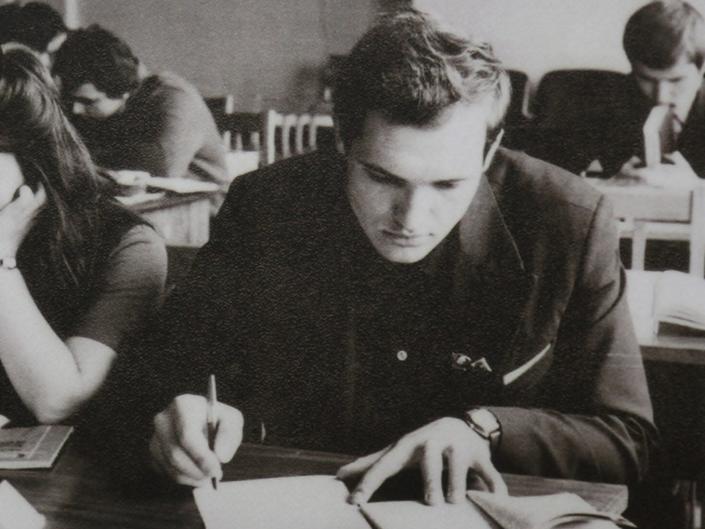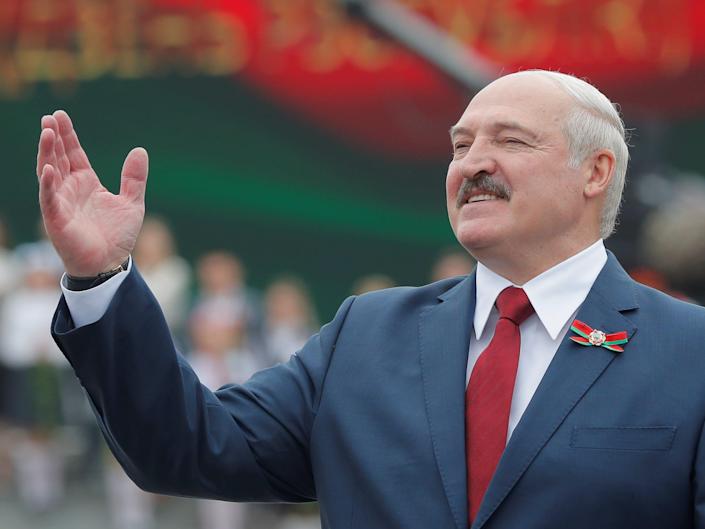
-
Alexander Lukashenko has ruled Belarus for over 26 years.
-
In 2020, he rigged an election and declared that he won 80% of the vote, naming himself president for a sixth term.
-
In May, he grounded a passenger plane in order to detain journalist Roman Protasevich.
Russian forces attacked Ukraine early on Thursday morning, with blasts heard from the capital city of Kyiv to the city of Kharkiv in the east. In an early morning address before the invasion, Russian President Vladimir Putin said he was aiming for the “demilitarization and de-Nazification of Ukraine.”
In response to the invasion, Ukrainian President Volodymyr Zelensky declared martial law in the country and urged people to stay calm and stay home.
In the lead-up to Thursday’s invasion, Belarusian President Alexander Lukashenko was also a vocal part of the conversation. On Tuesday, Lukashenko urged Ukraine to “stop” confronting Russia and to sever ties with their American “masters.”
“Stop! Shoo away these masters from over the ocean. They won’t bring you any happiness. As soon as they can’t use you any more, they will dump you at the junkyard of history,” said Lukashenko, in an speech to Belarus’s top military officials.
Lukashenko and Belarus are hosting some 30,000 troops on Putin’s behalf, 100 kilometers away from Kyiv. A column of military vehicles thought to be Russian troops was seen crossing the Senkivka crossing along the border Ukraine shares with Belarus just after dawn on Thursday, according to reporting from CNN.
So, just who is Alexander Lukashenko?
A strongman with a military background and Russian ties


The story of Lukashenko’s rise to power in Belarus begins in 1990. At the time, he was in his late 30s and was a promising young military man who had just won an election to a parliamentary seat in the Belarusian Soviet Socialist Republic.
Lukashenko held posts in the Soviet Army and membership in the Soviet communist youth wing. In 1993, he was named head of the Belarusian parliament’s anti-corruption commission.
In 1994, Lukashenko was elected president of Belarus with 80.3% of the vote, running on the pledge to “take the country back from the abyss.” He has managed to hold on to power since.
Perhaps the best encapsulation of Lukashenko’s life might be one that he wrote about himself.
“My life, just like the lives of other presidents, is very busy. You wake up and keep running. What does it feel like to be on the run for 25 years? I got used to it,” says a quote from Lukashenko displayed on his official online biography.
It continues: “This hamster wheel keeps spinning, and there is no escaping it. If you stop, it will keep moving and throw you back. This is a mode of life. I am used to it.”
‘Europe’s last dictator’


Lukashenko faced strong opposition in the 2020 election, and fearing that he might be toppled, he falsified election results, declaring that he won 80% of the vote and giving himself a sixth term.
This move sparked protests across the country. The UK and Canada imposed sanctions against Belarus officials in late 2020 as Western nations tried to take Lukashenko to task for rigging the elections and repressing peaceful protests.
According to Politico, it is estimated that more than 35,000 Belarusians were arrested during this uprising, with thousands facing abuse and torture in police custody. During the protests, Lukashenko attempted on multiple occasions to display a facade of strength, at one point releasing a video of himself stepping off a helicopter clad in a bulletproof vest while toting an assault rifle.
An ally to Vladimir Putin
Russian President Vladimir Putin has been a strong ally of the Belarusian leader. Putin extended a $1.5 billion loan to Belarus in 2020 as a “gesture of support” and volunteered aid from the Russian police during the protests.
Russia also sent in Kremlin-linked journalists to change the way the protests were covered in Belarusian state media, per Al Jazeera.
A 2020 report from the Guardian indicated Lukashenko was cracking under pressure, though he continued to resist calls to resign. Some media outlets dubbed Lukashenko “Europe’s last dictator” — though some argue that while he is a dictator, he will not be the last.
His handling of the COVID pandemic in Belarus drew widespread criticism and further calls for him to step down. But Lukashenko has maintained his grip on power. During a visit to a Minsk wheeled-tractor plant last year, he countered a question about fair elections by saying: “I am answering your question. We held elections. Until you kill me, there will be no other elections.”
A dictator who grounded a plane to quash one voice of dissent


Lukashenko made international headlines in May when Belarusian authorities, citing a bomb threat that never materialized, diverted a Ryanair passenger jet and forced it to land in Minsk. Police officers boarded the plane and arrested journalist Roman Protasevich, who is known for vocally opposing Lukashenko’s rule.
Protasevich is the cofounder and editor-in-chief of NEXTA, a news channel based in Poland that spread clips of mass protests against Lukashenko via encrypted messaging app Telegram. He was in exile in Lithuania until he and his girlfriend, Sofia Sapega, were dragged off the Ryanair plane and detained. Protasevich was later moved to house arrest. He stands accused of organizing riots and faces up to 15 years in jail if convicted.
The move drew condemnation from world leaders including the US.


Analysts at the time said the grounding of the Ryanair passenger plane was an indication that Lukashenko will continue to intensify his crackdown on independent media, even at the cost of provoking the international community.
“This is a political message to the Belarusian political migrants of the new wave, and on the other hand, to his supporters, the so-called ‘electoral swamp,'” Igar Tyshkevich, a Belarusian analyst based in Ukraine, told Al Jazeera.
“The message is that the government is strong and may get to anyone,” Tyshkevich added.
Read the original article on Business Insider




